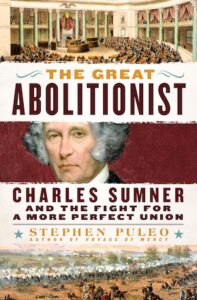 (St. Martins, April 2024)
(St. Martins, April 2024)
The groundbreaking biography of a forgotten civil rights hero.
In the tempestuous mid-19th century, as slavery consumed Congressional debate and America careened toward civil war and split apart–when the very future of the nation hung in the balance–Charles Sumner’s voice rang strongest, bravest, and most unwavering. Where others preached compromise and moderation, he denounced slavery’s evils to all who would listen and demanded that it be wiped out of existence. More than any other person of his era, he blazed the trail on the country’s long, uneven, and ongoing journey toward realizing its full promise to become a more perfect union.
Before and during the Civil War, at great personal sacrifice, Sumner was the conscience of the North and the most influential politician fighting for abolition. Throughout Reconstruction, no one championed the rights of emancipated people more than he did. Through the force of his words and his will, he moved America toward the twin goals of abolitionism and equal rights, which he fought for literally until the day he died. He laid the cornerstone arguments that civil rights advocates would build upon over the next century as the country strove to achieve equality among the races.
The Great Abolitionist is the first major biography of Charles Sumner to be published in over 50 years. Acclaimed historian Stephen Puleo relates the story of one of the most influential non-presidents in American history with evocative and accessible prose, transporting readers back to an era when our leaders exhibited true courage and authenticity in the face of unprecedented challenges.
Stephen Puleo is a historian, teacher, public speaker, and the author of several books, including Voyage of Mercy, Dark Tide, American Treasures, and The Caning. A former award-winning newspaper reporter and contributor to American History magazine, the Boston Globe, and other publications, he holds a master’s degree in history and has taught at the University of Massachusetts-Boston and Suffolk University. He and his wife, Kate, reside in the Boston area. for more on Puleo, please visit stephenpuleo.com.
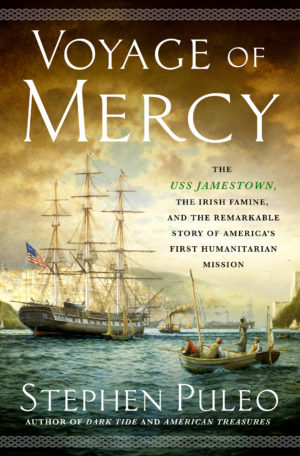 The USS Jamestown, the Irish Famine, and the Remarkable Story of America’s First Humanitarian Mission
The USS Jamestown, the Irish Famine, and the Remarkable Story of America’s First Humanitarian Mission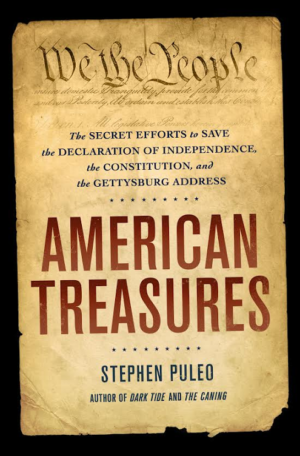 On December 26, 1941, Secret Service Agent Harry E. Neal stood on a platform at Washington’s Union Station, watching a train chug off into the dark and feeling at once relieved and inexorably anxious. These were dire times: as Hitler’s armies plowed across Europe, seizing or destroying the Continent’s historic artifacts at will, Japan bristled to the East. The Axis was rapidly closing in.
On December 26, 1941, Secret Service Agent Harry E. Neal stood on a platform at Washington’s Union Station, watching a train chug off into the dark and feeling at once relieved and inexorably anxious. These were dire times: as Hitler’s armies plowed across Europe, seizing or destroying the Continent’s historic artifacts at will, Japan bristled to the East. The Axis was rapidly closing in.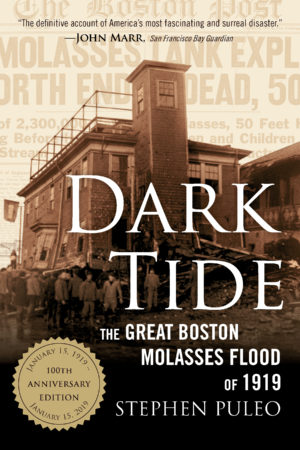 Around noon on January 15, 1919, a group of firefighters was playing cards in Boston’s North End when they heard a tremendous crash. It was like roaring surf, one of them said later. Like a runaway two-horse team smashing through a fence, said another. A third firefighter jumped up from his chair to look out a window-“Oh my God!” he shouted to the other men, “Run!”
Around noon on January 15, 1919, a group of firefighters was playing cards in Boston’s North End when they heard a tremendous crash. It was like roaring surf, one of them said later. Like a runaway two-horse team smashing through a fence, said another. A third firefighter jumped up from his chair to look out a window-“Oh my God!” he shouted to the other men, “Run!”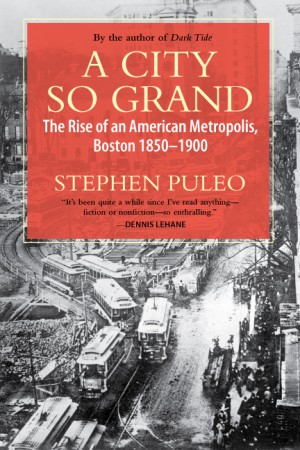 Between 1850 and 1900, Boston underwent a stunning metamorphosis from an insulated New England town into one of the world’s great metropolises—one that achieved worldwide prominence in politics, medicine, education, science, social activism, literature, commerce, and transportation.
Between 1850 and 1900, Boston underwent a stunning metamorphosis from an insulated New England town into one of the world’s great metropolises—one that achieved worldwide prominence in politics, medicine, education, science, social activism, literature, commerce, and transportation.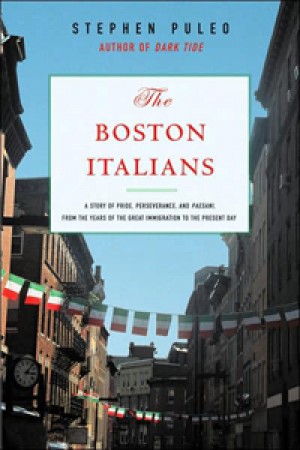 In this lively and engaging history, Stephen Puleo tells the story of the Boston Italians from their earliest years, when a largely illiterate and impoverished people in a strange land recreated the bonds of village and region in the cramped quarters of the North End. Focusing on this first and crucial Italian enclave in Boston, Puleo describes the experience of Italian immigrants as they battled poverty, illiteracy, and prejudice; explains their transformation into Italian Americans during the Depression and World War II; and chronicles their rich history in Boston up to the present day.
In this lively and engaging history, Stephen Puleo tells the story of the Boston Italians from their earliest years, when a largely illiterate and impoverished people in a strange land recreated the bonds of village and region in the cramped quarters of the North End. Focusing on this first and crucial Italian enclave in Boston, Puleo describes the experience of Italian immigrants as they battled poverty, illiteracy, and prejudice; explains their transformation into Italian Americans during the Depression and World War II; and chronicles their rich history in Boston up to the present day. Due to Enemy Action tells for the first time a World War II story that spans generations and straddles two centuries, a story that begins with the dramatic Battle of the Atlantic in the 1940s and doesn’t conclude until an emotional Purple Heart ceremony in 2002. Based on previously classified government documents, military records, personal interviews, and letters between crew members and their families, this is the saga of the courageous survival of ordinary sailors when their ship was torpedoed and their shipmates were killed on April 23, 1945, and the memories that haunted them after the U.S. Navy buried the truth at war’s end. It is the story of a small subchaser, the Eagle 56, caught in the crosshairs of a German U-boat, the U-853, whose brazen commander doomed his own crew in a desperate, last-ditch attempt to record final kills before his country’s imminent defeat. And it is the account of how one man, Paul M. Lawton, embarked on an unrelenting quest for the truth and changed naval history.
Due to Enemy Action tells for the first time a World War II story that spans generations and straddles two centuries, a story that begins with the dramatic Battle of the Atlantic in the 1940s and doesn’t conclude until an emotional Purple Heart ceremony in 2002. Based on previously classified government documents, military records, personal interviews, and letters between crew members and their families, this is the saga of the courageous survival of ordinary sailors when their ship was torpedoed and their shipmates were killed on April 23, 1945, and the memories that haunted them after the U.S. Navy buried the truth at war’s end. It is the story of a small subchaser, the Eagle 56, caught in the crosshairs of a German U-boat, the U-853, whose brazen commander doomed his own crew in a desperate, last-ditch attempt to record final kills before his country’s imminent defeat. And it is the account of how one man, Paul M. Lawton, embarked on an unrelenting quest for the truth and changed naval history.